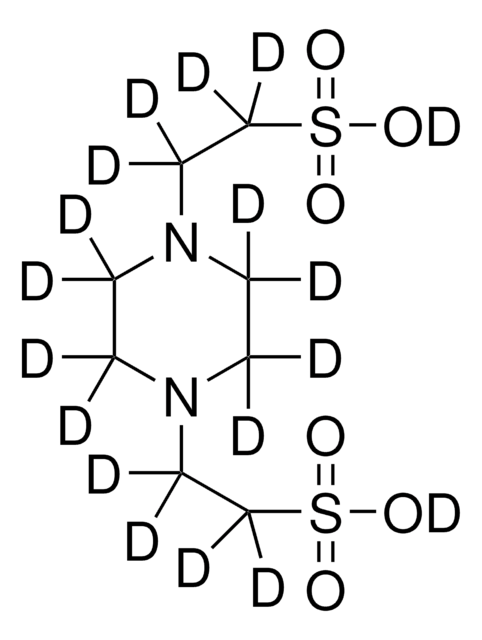P6757
PIPES
≥99% (titration)
Synonym(s):
1,4-Piperazinediethanesulfonic acid, Piperazine-1,4-bis(2-ethanesulfonic acid), Piperazine-N,N′-bis(2-ethanesulfonic acid)
About This Item
Recommended Products
Assay
≥99% (titration)
form
crystalline powder
useful pH range
6.1-7.5
pKa (25 °C)
6.8
mp
>300 °C (lit.)
solubility
1 M NaOH: 20 + 80 mL g, clear, colorless
application(s)
diagnostic assay manufacturing
SMILES string
OS(=O)(=O)CCN1CCN(CC1)CCS(O)(=O)=O
InChI
1S/C8H18N2O6S2/c11-17(12,13)7-5-9-1-2-10(4-3-9)6-8-18(14,15)16/h1-8H2,(H,11,12,13)(H,14,15,16)
InChI key
IHPYMWDTONKSCO-UHFFFAOYSA-N
Looking for similar products? Visit Product Comparison Guide
General description
Application
Alkaline phosphatase activity is lost selectively from certain rat hepatocyte organelles when fixed for ultracytochemistry with cacodylate-buffered glutaraldehyde. When PIPES was used as buffer, retention of activity was 60% greater.
Fixation of fungal zoospores for fluorescence microscopy and electron microscopy was optimal with a combination of glutaraldehyde and formaldehyde in PIPES buffer.
Linkage
Preparation Note
Storage Class Code
11 - Combustible Solids
WGK
WGK 3
Flash Point(F)
Not applicable
Flash Point(C)
Not applicable
Personal Protective Equipment
Certificates of Analysis (COA)
Search for Certificates of Analysis (COA) by entering the products Lot/Batch Number. Lot and Batch Numbers can be found on a product’s label following the words ‘Lot’ or ‘Batch’.
Already Own This Product?
Find documentation for the products that you have recently purchased in the Document Library.
Customers Also Viewed
Related Content
Find solutions for bulk production, custom packaging, and personalized chemical services to meet your unique research, development, and manufacturing requirements in your industries, including pharmaceuticals, biotechnology, and research institutions.
Our team of scientists has experience in all areas of research including Life Science, Material Science, Chemical Synthesis, Chromatography, Analytical and many others.
Contact Technical Service








